- Home
- Kahlil Gibran
Jesus the Son of Man Page 7
Jesus the Son of Man Read online
Page 7
To Him the root of a buttercup was a longing towards God, while to us it
is naught but a root.
URIAH
AN OLD MAN OF NAZARETH
HE WAS A STRANGER IN OUR MIDST, AND HIS LIFE WAS
hidden with dark veils.
He walked not the path of our God, but followed the course of the foul
and the infamous.
His childhood revolted, and rejected the sweet milk of our nature.
His youth was inflamed like dry grass that burns in the night.
And when He became man, He took arms against us all.
Such men are conceived in the ebb tide of human kindness, and born in
unholy tempests. And in tempests they live a day and then perish forever.
Do you not remember Him, a boy overweening, who would argue with our
learned elders, and laugh at their dignity?
And remember you not His youth, when He lived by the saw and the chisel?
He would not accompany our sons and daughters on their holidays. He would
walk alone.
And He would not return the salutation of those who hailed Him, as though
He were above us.
I myself met Him once in the field and greeted Him, and He only smiled,
and in His smile I beheld arrogance and insult.
Not long afterward my daughter went with her companions to the vineyards
to gather the grapes, and she too spoke to Him and He did not answer her.
He spoke only to the whole company of grape-gatherers, as if my daughter
had not been among them.
When He abandoned His people and turned vagabond He became naught but a
babbler. His voice was like a claw in our flesh, and the sound of His
voice is still a pain in our memory.
He would utter only evil of us and of our fathers and forefathers. And
His tongue sought our bosoms like a poisoned arrow.
Such was Jesus.
If He had been my son, I would have committed Him with the Roman legions
to Arabia, and I would have begged the captain to place Him in the
forefront of the battle, so that the archer of the foe might mark Him,
and free me of His insolence.
But I have no son. And mayhap I should be grateful. For what if my son
had been an enemy of his own people, and my gray hairs were now seeking
the dust with shame, my white beard humbled?
NICODEMUS THE POET
THE YOUNGEST OF THE ELDERS
IN THE SANHEDRIM
MANY ARE THE FOOLS WHO SAY THAT JESUS stood in His own path and opposed
Himself; that He knew not His own mind, and in the absence of that
knowledge confounded Himself.
Many indeed are the owls who know no song unlike their own hooting.
You and I know the jugglers of words who would honor only a greater
juggler, men who carry their heads in baskets to the market-place and
sell them to the first bidder.
We know the pygmies who abuse the sky-man. And we know what the weed
would say of the oak tree and the cedar.
I pity them that they cannot rise to the heights.
I pity the shrivelling thorn envying the elm that dares the seasons.
But pity, though enfolded by the regret of all the angels, can bring them
no light.
I know the scarecrow whose rotting garments flutter in the corn, yet he
himself is dead to the corn and to the singing wind.
I know the wingless spider that weaves a net for all who fly.
I know the crafty, the blowers of horns and the beaters of drums, who in
the abundance of their own noise cannot hear the skylark nor the east
wind in the forest.
I know him who paddles against all streams, but never finds the source,
who runs with all rivers, but never dares to the sea.
I know him who offers his unskilled hands to the builder of the temple,
and when his unskilled hands are rejected, says in the darkness of his
heart,
I will destroy all that shall be builded."
I know all these. They are the men who object that Jesus said on a
certain day, "I bring peace unto you," and on another day, "I bring a
sword."
They cannot understand that in truth he said, "I bring peace unto men of
goodwill, and I lay a sword between him who would peace and him who would
a sword."
They wonder that He who said, "My kingdom is not of this earth," said
also, "Render unto Caesar that which is Caesar's "; and know not that if
they would indeed be free to enter the kingdom of their passion, they
must not resist the gate-keeper of their necessities. It behooves them
gladly to pay that dole to enter into that city.
"These are the men who say, "He preached tenderness and kindliness and
filial love, yet He would not heed His mother and His brothers when they
sought Him in the streets of Jerusalem."
They do not know that His mother and brothers in their loving fear would
have had Him return to the bench of the carpenter, whereas He was opening
our eyes to the dawn of a new day.
His mother and His brothers would have had Him live in the shadow of
death, but He Himself was challenging death upon yonder hill that He
might live in our sleepless memory.
I know these moles that dig paths to nowhere. Are they not the ones who
accuse Jesus of glorifying Himself in that He said to the multitude, "I
am the path and the gate to salvation," and even called Himself the life
and the resurrection.
But Jesus was not claiming more than the month of May claims in her high
tide.
Was He not to tell the shining truth because it was so shining?
He indeed said that He was the way and the life and the resurrection of
the heart; and I myself am a testimony to His truth.
Do you not remember me, Nicodemus, who believed in naught but the laws
and decrees and was in continual subjection to observances?
And behold me now, a man who walks with life and laughs with the sun from
the first moment it smiles upon the mountain until it yields itself to
bed behind the hills.
Why do you halt before the word salvation? I myself through Him have
attained my salvation.
I care not for what shall befall me tomorrow, for I know that Jesus
quickened my sleep and made my distant dreams my companions and my
roadfellows.
Am I less man because I believe in a greater man?
The barriers of flesh and bone fell down when the Poet of Galilee spoke
to me; and I was held by a spirit, and was lifted to the heights, and in
midair my wings gathered the song of passion.
And when I dismounted from the wind and in the Sanhedrim my pinions were
shorn, even then my ribs, my featherless wings, kept and guarded the
song. And all the poverties of the lowlands cannot rob me of my treasure.
I have said enough. Let the deaf bury the humming of life in their dead
ears. I am content with the sound of His lyre, which He held and struck
while the hands of His body were nailed and bleeding.
JOSEPH OF ARIMATMEA
TEN YEARS AFTER
HERE WERE TWO STREAMS RUNNING IN THE heart of the Nazarene: the stream of
kinship to God whom He called Father, and the stream of rapture which He
called the kingdom of the Above-world.
And in my solitude I thought of Him and I f
ollowed these two streams in
His heart. Upon the banks of the one I met my own soul; and sometimes my
soul was a beggar and a wanderer, and sometimes it was a princess in her
garden.
Then I followed the other stream in His heart, and on my way I met one
who had been beaten and robbed of his gold, and he was smiling. And
farther on I saw the robber who had robbed him, and there were unshed
tears upon his face.
Then I heard the murmur of these two streams in my own bosom also, and I
was gladdened.
When I visited Jesus the day before Pontius Pilatus and the elders laid
hands on Him, we talked long, and I asked Him many questions, and He
answered my questionings with graciousness; and when I left Him I knew He
was the Lord and Master of this our earth.
It is long since the cedar tree has fallen, but its fragrance endures,
and will forever seek the four corners of the earth.
GEORGUS OF BEIRUT
HE AND HIS FRIENDS WERE IN THE GROVE of pines beyond my hedge, and He was
talking to them.
I stood near the hedge and listened. And I knew who He was, for His fame
had reached these shores ere He Himself visited them.
When He ceased speaking I approached Him, and I said, "Sir, come with
these men and honor me and my roof."
And He smiled upon me and said, "Not this day, my friend. Not this day."
And there was a blessing in His words, and His voice enfolded me like a
garment on a cold night.
Then He turned to His friends and said, "Behold a man who deems us not
strangers, and though He has not seen us ere this day, he bids us to His
threshold.
"Verily in my kingdom there are no strangers. Our life is but the life of
all other men, given us that we may know all men, and in that knowledge
love them.
"The deeds of all men are but our deeds, both the hidden and the
revealed.
"I charge you not to be one self but rather many selves, the householder
and the homeless, the ploughman and the sparrow that picks the grain ere
it slumber in the earth, the giver who gives in gratitude, and the
receiver who receives in pride and recognition.
"The beauty of the day is not only in what you see, but in what other men
see.
"For this I have chosen you from among the many who have chosen me."
Then He turned to me again and smiled and said, "I say these things to
you also, and you also shall remember them."
Then I entreated Him and said, "Master, will you not visit in my house?"
And He answered, "I know your heart, and I have visited your larger
house."
And as He walked away with His disciples He said, "Good-night, and may
your house be large enough to shelter all the wanderers of the land."
MARY MAGDALEN
HIS MOUTH WAS LIKE THE HEART OF A POMEGRANATE,
and the shadows in His eyes were deep.
And He was gentle, like a man mindful of his own strength.
In my dreams I beheld the kings of the earth standing in awe in His
presence.
I would speak of His face, but how shall I?
It was like night without darkness, and like day without the noise of
day.
It was a sad face, and it was a joyous face.
And well I remember how once He raised His hand towards the sky, and His
parted fingers were like the branches of an elm.
And I remember Him pacing the evening. He was not walking. He Himself was
a road above the road; even as a cloud above the earth that would descend
to refresh the earth.
But when I stood before Him and spoke to Him, He was a man, and His face
was powerful to behold. And He said to me, "What would you, Miriam?"
I did not answer Him, but my wings enfolded my secret, and I was made
warm.
And because I could bear His light no more, I turned and walked away, but
not in shame. I was only shy, and I would be alone, with His fingers upon
the strings of my heart.
JOTHAM OF NAZARETH
TO A ROMAN
MY FRIEND, YOU LIKE ALL OTHER ROMANS would conceive life rather than live
it. You would rule lands rather than be ruled by the spirit.
You would conquer races and be cursed by them rather than stay in Rome
and be blest and happy
You think but of armies marching and of ships launched into the sea.
How shall you then understand Jesus of Nazareth, a man simple and alone,
who came without armies or ships, to establish a kingdom in the heart and
an empire in the free spaces of the soul?
How shall you understand this man who was not a warrior, but who came
with the power of the mighty ether?
He was not a god, He was a man like unto ourselves; but in Him the myrrh
of the earth rose to meet the frankincense of the sky; and in His words
our lisping embraced the whispering of the unseen; and in His voice we
heard a song unfathomable.
Aye, Jesus was a man and not a god, and therein lies our wonder and our
surprise.
But you Romans wonder not save at the gods, and no man shall surprise
you. Therefore you understand not the Nazarene.
He belonged to the youth of the mind and you belong to its old age.
You govern us today; but let us wait another day.
Who knows but that this man with neither armies nor ships shall govern
tomorrow?
We who follow the spirit shall sweat blood while journeying after Him.
But Rome shall lie a white skeleton in the sun.
We shall suffer much, yet we shall endure and we shall live. But Rome
must needs fall into the dust.
Yet if Rome, when humbled and made low, shall pronounce His name, He will
heed her voice. And He will breathe new life into her bones that she may
rise again, a city among the cities of the earth.
But this He shall do without legions, nor with slaves to oar His galleys.
He will be alone.
EPHRAIM OF JERICHO
WHEN HE CAME AGAIN TO JERICHO sought Him out and said to Him, "Master, on
the morrow my son will take a wife. I beg you come to the wedding-feast
and do us honor, even as you honored the wedding at Cana of Galilee."
And He answered, "It is true that I was once a guest at a wedding-feast,
but I shall not be a guest again. I am myself now the Bridegroom."
And I said, "I entreat you, Master, come to the wedding-feast of my son."
And He smiled as though He would rebuke me, and said, "Why Go you entreat
me? Have you not wine enough?"
And I said, "My jugs are full, Master; yet I beseech you, come to my
son's wedding-feast."
Then He said, "Who knows? I may come, I may surely come, if your heart is
an altar in your temple."
Upon the morrow my son was married, but Jesus came not to the
wedding-feast. And though we had many guests, I felt that no one had
come.
In very truth, I myself who welcomed the guests, was not there.
Perhaps my heart had not been an altar when I invited Him. Perhaps I
desired another miracle.
BARCA
A MERCHANT OF TYRE
I BELIEVE THAT NEITHER THE ROMANS NOR THE JEWS
understood Jesus of Nazareth, nor did His disciples who n
ow preach His
name.
The Romans slew Him and that was a blunder. The Galileans would make a
god of Him and that is a mistake.
Jesus was of the heart of man.
I have sailed the Seven Seas with my ships, and bartered with kings and
princes and with cheats and the wily in the market-places of distant
cities; but never have I seen a man who understood merchants as He did.
I heard Him once tell this parable:
"A merchant left his country for a foreign land. He had two servants, and
he gave each a handful of gold, saying: 'Even as I go abroad, you also
shall go forth and seek profit. Make just exchange, and see that you
serve in giving and taking.'
And after a year the merchant returned.
And he asked his two servants what they had done with his gold.
"The first servant said, 'Behold, Master, I have bought and sold, and I
have gained.'
"And the merchant answered, 'The gain shall be yours, for you have done
well, and have been faithful to me and to yourself.'
"Then the other servant stood forth and said, "Sir, I feared the loss of
your money; and I did not buy nor sell. Behold, it is all here in this
purse.'
"And the merchant took the gold, and said, 'Little is your faith. To
barter and lose is better than not to go forth. For even as the wind
scatters her seed and waits for the fruit, so must all merchants. It were
fitter for you henceforth to serve others.'"
When Jesus spoke thus, though He was no merchant, He disclosed the secret
of commerce.
Moreover, His parables often brought to my mind lands more distant than
my journeys, and yet nearer than my house and my goods.
But the young Nazarene was not a god; and it is a pity His followers seek
to make a god of such a sage.
PHUMIAH
THE HIGH PRIESTESS OF SIDON
TO THE OTHER PRIESTESSES
TAKE YOUR HARPS AND LET ME SING.
Beat your strings, the silver and the gold;
For I would sing the dauntless Man
Who slew the dragon of the valley,
Then gazed down with pity
Upon the thing He had slain.
Take your harps and sing with me
The lofty Oak upon the height,
The sky-hearted and the ocean-handed Man,
Who kissed the pallid lips of death,
Yet quivers now upon the mouth of life.
Take your harps and let us sing
The fearless Hunter on the hill,
Who marked the beast, and shot His viewless arrow,
And brought the horn and tusk
Down to the earth.
Take your harps and sing with me
The valiant Youth who conquered the mountain cities,
And the cities of the plain that coiled like serpents in the sand.
He fought not against pygmies but against gods
Who hungered for our flesh and thirsted for our blood.
And like the first Golden Hawk
He would rival only eagles;
For His wings were vast and proud
And would not outwing the less winged.
Take your harps and sing with me
The joyous song of sea and cliff.
The gods are dead,
And they are lying still
In the forgotten isle of a forgotten sea.
And He who slew them sits upon His throne.
He was but a youth.
Spring had not yet given Him full beard,
And His summer was still young in His field.
Take your harps and sing with me
The tempest in the forest
That breaks the dry branch and the leafless twig,
Yet sends the living root to nestle deeper at the breast of earth.
Take your harps and sing with me

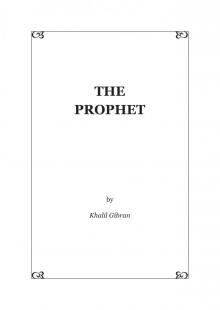 The Prophet
The Prophet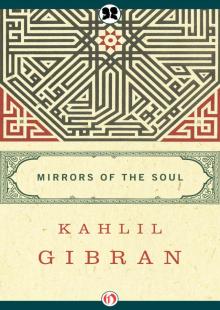 Mirrors of the Soul
Mirrors of the Soul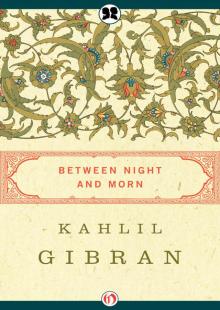 Between Night and Morn
Between Night and Morn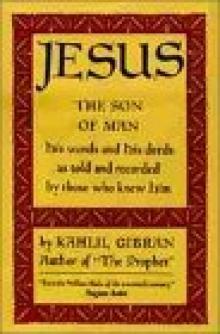 Jesus the Son of Man
Jesus the Son of Man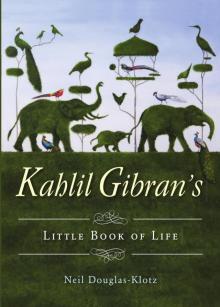 The Little Book of Life's Wisdom
The Little Book of Life's Wisdom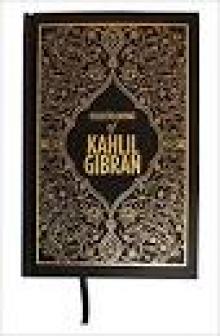 The Kahlil Gibran Collection
The Kahlil Gibran Collection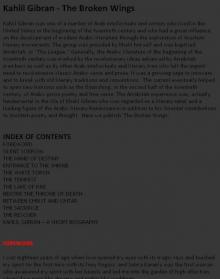 The Broken Wings
The Broken Wings Collected Poetical Works of Kahlil Gibran
Collected Poetical Works of Kahlil Gibran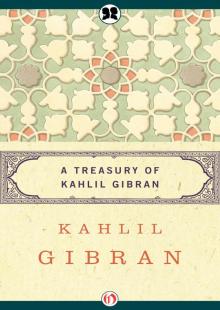 The Treasured Writings of Kahlil Gibran
The Treasured Writings of Kahlil Gibran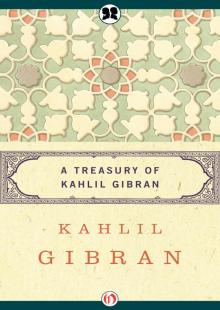 Treasury of Kahlil Gibran
Treasury of Kahlil Gibran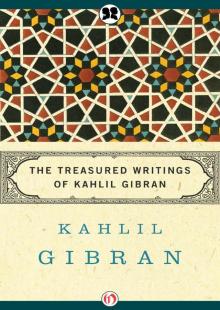 Treasured Writings of Kahlil Gibran
Treasured Writings of Kahlil Gibran